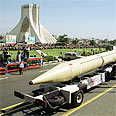
Army chief issues missile warning
Speaking at Tel Aviv University, Dan Halutz stresses need to counter Qassam threat through new technology, intelligence efforts. Responding to question, chief of staff says West has technical capability to hit Iran's nuclear facilities
With the onset of 2006, the State of Israel is increasingly facing missile and rocket threats of various kinds, ranging from makeshift Qassams manufactured in the Gaza Strip to Shihab-3 ballistic missiles built by Iran Iran, Army Chief Dan Halutz said Tuesday.
The war against Qassam rockets fired from the Gaza Strip at Israel is challenging and requires advanced technologies for precision targeting, pinpoint intelligence and resolution, Halutz said, two days after Palestinian groups announced they were no longer committed to a lull in violence.
The threat of Qassam rockets is not limited to Israel’s security but also to its economy, said Halutz, referring to Ashkelon’s industrial zone and sensitive facilities in the area currently within the range of Qassam rockets fired from northern Gaza.
The IDF is seeking to improve its capability to defend communities, businesses and industrial zones exposed to the danger of Qassam fire, the chief of staff said, adding that funds have been allocated to develop better defense systems over the next few years.
'West able to strike Iran nuke facilities'
Speaking at Tel Aviv University, Halutz addressed another challenge facing the army’s top commanders: Developing combat strategies fitting for low intensity conflict, which involves operations among civilian populations. The IDF is seeking to improve its combatants’ capability to differentiate between terrorists, innocent civilians and fellow combatants, he said.
"An operational challenge facing us is how to fight in these (civilian) areas that have high population density and limit our possibilities to use force as a country with moral values," Halutz said. "Since we do not wish to remove these limitations, we need to develop strategies that will allow us to differentiate enemies from innocent people so as not to hurt those uninvolved in terror activities and to reduce damage to environment."
"Although the IDF has sophisticated combat know-how, there is always room for improvement. We are committed to continue developing capabilities that will provide us with real time images from the field, especially when dealing with deadly targets. We are moving forward in this direction, yet remain far from a full solution,” Halutz added.
Finally, asked whether western countries are capable of launching a military operation to neutralize Iran’s nuclear project without getting Israel involved, Halutz replied: "This is not a question for noontime, but professionally speaking, the answer is 'yes.'"










